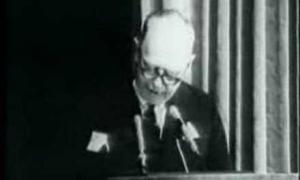In his famous 1967 farewell speech, advertising legend Leo Burnett told employees exactly how to preserve his legacy—and, exactly what they ought to do if they couldn’t. (See here for an explanation of Burnett’s references to apples. —ed.)
Somewhere along the line, after I’m finally off the premises, you—or your successors—may want to take my name off the premises, too.
You may want to call yourselves “Twain, Rogers, Sawyer and Finn, Inc. … or “Ajax Advertising” or something.
That will certainly be OK with me—if it’s good for you.
But let me tell you when I might demand that you take my name off the door.
That will be the day when you spend more time trying to make money and less time making advertising—our kind of advertising.
When you forget that the sheer fun of ad making and the lift you get out of it – the creative climate of the place—should be as important as money to the very special breed of writers and artists and business professionals who compose this company of ours—and make it tick.
When you lose that restless feeling that nothing you do is ever quite good enough.
When you lose your itch to the job well for it’s sake—regardless of the client, or money, or the effort it takes.
When you lose your passion for thoroughness…you hatred of loose ends.
When you stop reaching the manner, the overtones, the marriage of words and pictures that produce the fresh, the memorable and the believable effect.
When you stop rededicating yourselves every day to the idea that better advertising is what the Leo Burnett Company is about.
When you are no longer what Thoreau called “a corporation with a conscience”—which means to me, a corporation of conscientious men and women.
When you begin to compromise your integrity—which has always been the heart’s blood—the very guts of this agency.
When you stoop to convenient expediency and rationalize yourselves into acts of opportunism—for the sake of a fast buck.
When you show the slightest sign of crudeness, inappropriateness or smart—aleckness—and you lose that subtle sense of the fitness of things.
When your main interest becomes a matter of size just to be big—rather that good, hard, wonderful work.
When your outlook narrows down to the number of windows—from zero to five—in the walls of your office.
When you lose your humility and become big-short wisenheimers…. a little bit too big for your boots.
When the apples come down to being just apples for eating (or for polishing)—no longer part of our tone or personality.
When you disprove of something, and start tearing the hell out of the man who did it rather than the work itself.
When you stop building on strong and vital ideas, and start a routine production line.
When you start believing that, in the interest of efficiency, a creative spirit and the urge to create can be delegated and administrated, and forget that they can only be nurtured, stimulated, and inspired.
When you start giving lip service to this being a “creative agency” and stop really being one.
Finally, when you lose your respect for the lonely man – the man at his typewriter or his drawing board or behind his camera or just scribbling notes with one of our big pencils—or working all night on a media plan. When you forget that the lonely man—and thank God for him—has made the agency we now have—possible. When you forget he’s the man who, because he is reaching harder, sometimes actually gets hold of for a moment – one of those hot, unreachable stars.
THAT, boys and girls, is when I shall insist you take my name off the door. And by golly, it will be taken off the door. Even if have to materialize long enough some night to rub it out myself—on every one of our floors. And before I DE-materialize again, I will paint out that star-reaching symbol too. And burn all the stationary. Perhaps tear up a few ads in passing.
And throw every god-damned apple down the elevator shafts.
You just won’t know the place, the next morning. You’ll have to find another name.

